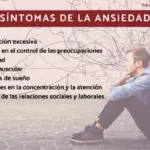Anxiety is a natural sensation in human beings, and there is nothing strange about feeling it in certain situations in our lives. Uncomfortable moments of stress or frustration are generally also accompanied by feelings of anxiety. However, there are extreme cases in which anxiety greatly damages our quality of life.
In this article We will examine how to help a person with Generalized Anxiety Disorder (friends, family, partner, etc.) through a list of practical advice that we can apply in our daily lives, we also review the concept of this disorder.
What is TAG?
To understand how to help a person with Generalized Anxiety Disorder (GAD) It is best to understand what exactly this psychological alteration is about
In short, it is a persistent state of anguish caused by anxiety, which affects the person constantly (for several months) and intensely, and which generally has no logical reasons.
People who present this pathology They manifest an accelerated thinking pattern with a catastrophic, pessimistic tendency This means that they imagine that things are always going to go wrong, even before they have started doing them. It is precisely this negative way of always anticipating situations that generates constant discomfort, which affects the subject in various areas of their daily life (personal, family, work).
When the subject is frequently anxious, and also with a high degree of intensity, we may be facing this disorder. However, diagnosis can only be made by mental health professionals
The causes of this pathology can be biological (brain chemistry) or environmental (social factors), although normally both play an important role. The ideal is to carry out both neurological and psychological evaluations to clearly establish the origin of the anxiety.
Symptoms of this disorder
The symptoms of this disorder vary depending on the causes and the stage of evolutionary development in which the person is; It is not the same to have generalized anxiety in adolescence as in adulthood.
During the young stages of development, the symptoms may become more acute. Adults generally manage to self-regulate themselves. However, It is recommended that you seek professional help regardless of the person’s age
Let’s look in more detail at some of these most common symptoms:
How to help someone with Generalized Anxiety Disorder?
Now we will see some ways in which we could provide help and support to people with Generalized Anxiety Disorder
1. Show constant support
It is important that the support we give to people with this disorder is constant. They are anxious subjects, and The fact that our help is intermittent would affect them even more in terms of the negative thoughts they present
The ideal is to make a structured support plan, where we establish times and dates in which we can assist the subject, so that we avoid failing to keep any appointment or commitment that we have made with this person.
2. Find out about the disorder
The more information we have regarding this disorder, the clearer we will have the opportunity to provide support to people who need it. If we are able to understand why they behave the way they do, we can be more empathetic and less critical regarding their behavior
3. Accompany during therapy
Therapy is an essential factor so that this disorder can be managed correctly It is important that we make the person understand that they require treatment from a specialist. The fact that we accompany the subject to therapy will generate a feeling of security that will make it easier for them not to abandon therapy, at least at the beginning.
4. Vent to someone else
In general, providing help to people with a disorder is exhausting for those who take the trouble to do it. It is important that those who support others in this way also take time for themselves and have someone to discuss their experiences with and express how they feel.
5. Generate an entertaining atmosphere
Subjects with Generalized Anxiety Disorder live under a constant feeling of anguish. One way to alleviate this discomfort is to generate an environment where worries dissipate and there is an opportunity to laugh at everyday things
Reducing the seriousness of problems helps to adopt a more neutral position and little prone to catastrophic thoughts. In this way, we show that person that not everything is as bad as he thinks.
6. Encourage your social relationships
It is quite common for people with Generalized Anxiety Disorder to feel insecure when interacting with others, for fear that things will not go well, and this causes them to limit themselves or completely deprive themselves of initiating social ties with others.
It is important to promote sociability in them , demonstrating that interpersonal relationships, no matter how complicated they may seem, are necessary and can help a lot to improve the quality of life. Of course, you should not force or adopt an antagonistic attitude, because that will generate more anxiety; You just have to facilitate dialogues and social interactions to occur, give the opportunity to desocialize, with the person with GAD having the last word.
7. Help him organize
A factor that greatly helps reduce anxiety levels in people is have some degree of control over their activities Giving people with generalized anxiety the necessary tools so they can be organized is very helpful for them.
For example, you can help him when designing his schedule, encouraging him to print it out and hang it in places in his house that he will see frequently, and by keeping his bedtime always the same. Maintaining consistency in the moments of the day that you will dedicate to sleep will help you mitigate anxiety problems, and in addition, schedule tables make it possible to be clear about the sequence of actions to be carried out at each moment, something that helps you focus and get rid of worries. psychological rumination.









